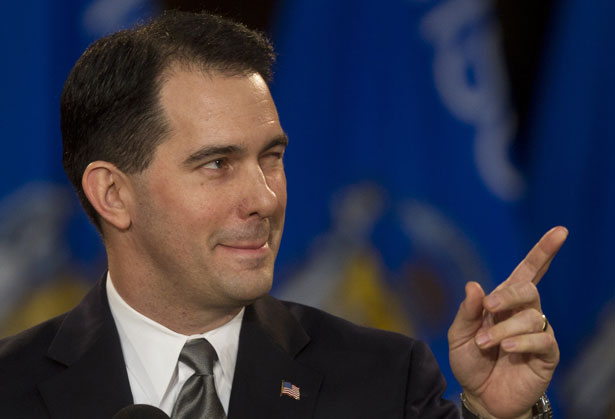Submitted by Brendan Fischer on
Ten months after beating back a recall, Governor Scott Walker continues to divide Wisconsin, with his shadow hanging over judicial races in Milwaukee, Ozaukee, and Dane Counties. Those normally sleepy races are also attracting new levels of outside money, and demonstrate how Walker remains a polarizing figure in the state even as he mulls a run for president.
 Thanks in part to Walker's divisive approach to governing, Wisconsin's partisan chasm is wider than any other state in the country. Only 9 percent of Democrats approve of his performance, whereas 92 percent of Republicans approve, according to a Public Policy Polling survey from February. That divide is greater than anything Public Policy Polling has recorded in any other state.
Thanks in part to Walker's divisive approach to governing, Wisconsin's partisan chasm is wider than any other state in the country. Only 9 percent of Democrats approve of his performance, whereas 92 percent of Republicans approve, according to a Public Policy Polling survey from February. That divide is greater than anything Public Policy Polling has recorded in any other state.
Walker has recently hinted at a 2016 presidential bid, and has started writing a book with a former Bush administration advisor, further suggesting his presidential aspirations.
"For me, it's really a measure of what I've accomplished and what more I could accomplish if I was in a different position," he told Politico.
But his "accomplishments" not only include a dismal economy -- Wisconsin ranks 44th out of all 50 states for job creation, far short of his 250,000 jobs campaign promise -- but also helping the state become one of the most divided in the county.
And even candidates in officially non-partisan races for judge are angling for votes using the specter of Walker.
"Handpicked by Walker"
In the Milwaukee judicial race, Janet Protasiewicz is trying to unseat Judge Rebecca Bradley, a former corporate lawyer who Walker appointed to the bench in November 2012. Bradley is a Walker contributor, and her campaign manager, Nate Ristow, was Assistant Legal Counsel in Walker's state administration and is a Walker campaign veteran.
Protasiewicz' first ad attacks Bradley for being "handpicked by Walker" and for giving to Walker's political campaigns. It also hits her for "working with extreme right wing groups that make it harder to vote in Milwaukee County," a reference to Bradley's work with the Republican National Lawyers Association, which has hyped "voter fraud" allegations to advance restrictive voting measures like voter ID.
Although Walker won his recall election in June of 2012, 63.3 percent of Milwaukee County voters went for his opponent, Milwaukee Mayor Tom Barrett.
As the Milwaukee race has heated up, the right-wing special interest group Club for Growth has dropped a reported $167,000 on TV ads. The group has long been a Walker ally. Just three days after Walker introduced his union-busting Act 10 in February 2011, Club for Growth started running ads attacking public sector employees as overpaid and urging support for the bill, and spent over $805,000 on the ads in less than a month. Overall, the Club spent over $9.1 million supporting Walker and Republican legislators in the 2011 and 2012 recall elections.
"Outside special interest groups have no place in our courtrooms or judicial campaigns," said Protasiewicz campaign manager Marshall Cohen. "The Wisconsin Club for Growth is a shady, right-wing group supported by secretive money that is trying to buy a judicial seat in Milwaukee County."
Club for Growth is also reportedly spending on a judicial election in Ozaukee County, where lawyer Joseph Voiland is challenging incumbent Judge Thomas Wolfgram. Walker is a major issue in that campaign, too, but from the other direction: Voiland is attacking Judge Wolfgram for signing a petition in support of Walker's recall. 70.6 percent of Ozaukee County voters supported Walker in his recall election. Judge Wolfgram's recall petition signature is featured on the front page of Voiland's campaign website.
Walker Casts Shadow in Dane County
In Dane County -- home of the state capitol and liberal Madison -- attorney Rhonda Lanford is targeting incumbent Judge Rebecca St. John for having been appointed by Walker in 2012. 69 percent of Dane County voters chose Walker's opponent in the 2012 recall election.
Dane County judges have often served as a check on the extremes of the legislature. During the 2011 protests, for example, Dane County Judge Maryann Sumi initially overturned Act 10 for violating the state's open meetings law, and Judge David Moeser ordered the Walker administration to keep the Capitol open to the public.
Lanford's TV ad targets St. John not only having been appointed by Walker, but also for allegedly abdicating the judiciary's legislature-checking powers. "Chosen by Scott Walker, Rebecca St. John believes the Legislature should limit the power of our courts," the ad reads over an image of two hands shaking, suggesting an allegiance between Walker and St. John.
Judge St. John, in response, has been trying to tout her progressive bona fides, including an endorsement from Dane County Sheriff Dave Mahoney (who famously "refused to put deputy sheriffs in a position to be palace guards" and block access to the Capitol during the 2011 protests).
Judicial races are officially nonpartisan, but many voters in a divided Wisconsin may select their judges based on how closely they are tied to Scott Walker.
